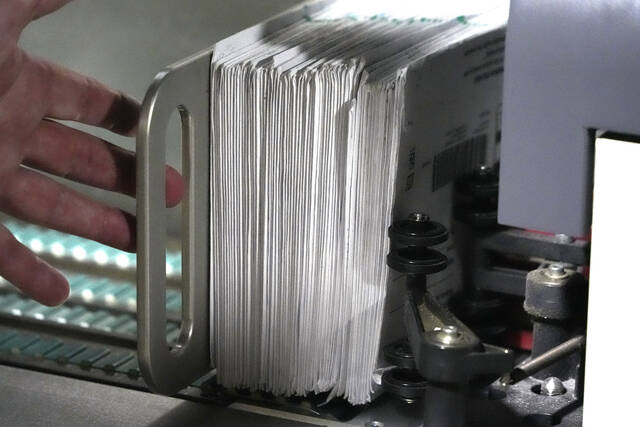https://development.triblive.com/local/regional/pa-appeals-court-hears-arguments-about-misdated-mail-in-ballots/
Pa. appeals court hears arguments about misdated mail-in ballots

A government attorney told an appellate court Thursday that no county elections board in Pennsylvania uses the handwritten date on the outer envelope of mail-in ballots for any purpose.
Why then, he asked, should a mistake in the date disallow a person’s vote?
“A rule that serves no purpose should not disenfranchise voters,” said Michael Fischer of the Pennsylvania Office of General Counsel. “That’s all we’re asking for here.”
A five-judge panel of the Commonwealth Court heard more than two hours of oral arguments in a case that could have a significant impact nationally as Pennsylvania plays a starring role in this year’s general election.
In May, voting rights organizations sued the Pennsylvania secretary of state and elections boards in Allegheny and Philadelphia counties. They claimed failure to count mail-in ballots with undated or misdated return envelopes resulted in 10,000 disenfranchised voters in the 2022 election and thousands more — the exact number is unknown — in this year’s primary.
The plaintiffs, which include the Black Political Empowerment Project, Common Cause and POWER Interfaith, seek to have the Commonwealth Court declare it unconstitutional under state law to reject a ballot for having an incorrect handwritten date on the outer envelope.
Pennsylvania’s Secretary of State, Al Schmidt, has taken the side of the petitioners in the case, arguing the date is irrelevant to the mail-in voting process.
However, the Republican National Committee and Republican Party, which were given permission to intervene in the case, argued the date requirement serves a variety of purposes and is required by the Legislature that implemented mail-in voting.
John Gore, a committee attorney, said the date serves several functions: ensuring a voter’s ballot was completed and submitted on time; attesting to the voter’s choices on the ballot; and detecting and deterring fraud.
Gore claimed, if the date is flagged as problematic, it could be used as confirmation of a fraudulent ballot.
“You can imagine scenarios where the date itself is relevant to some kind of challenge,” Gore said.
Gore urged the court to dismiss the petition, arguing the plaintiffs failed to show the date requirement is so unduly burdensome that it violates the state constitution.
“It does not make voting so difficult as to deny the franchise,” he said. “That’s the standard for the Free and Equal Elections standard here.”
The court said it would take the issue under advisement and issue its opinion as quickly as it can.
Disenfranchised
The lawsuit focused mainly on state constitutional claims, unlike several previous cases that sought relief under federal law.
The American Civil Liberties Union of Pennsylvania, which represents the voting rights groups, hopes the case will settle for good the question of whether undated mail-in ballots ought to be counted.
According to the petition, since Pennsylvania’s Legislature implemented mail-in voting, millions of people have cast their ballots that way, including more than 714,000 people in this year’s primary.
However, more than 10,000 votes in 2022 were not counted because of undated or misdated return envelopes.
Commonwealth Judge Patricia McCullough questioned why the petitioners even had standing in the case.
“I don’t know how the dating requirement disenfranchises your constituents,” she said.
Attorney Stephen Loney, who represents the petitioners, argued members of the League of Women Voters did not have their vote counted because of the date requirements.
But, more than that, he said the voting rights groups who challenged the requirement now must spend time and resources educating voters on the necessity of dating ballots accurately, which has taken away their ability to work on get-out-the-vote and other educational efforts.
McCullough repeatedly countered the plaintiffs’ argument, stating signing and dating the ballot envelope is similar to writing a check.
“It’s important to know when the dates are that these things occur,” she said.
But Loney said the date on the envelope is not part of the proof the voter filled out the ballot.
The ballot has a signature and is contained in the secrecy envelope, he said. And, provided the ballot is received by 8 p.m. on Election Day, it’s clear it’s timely, Loney said.
Both Loney and Fischer, the state’s lawyer, told the court the date requirement is irrelevant.
“It serves no purpose in election administration at all,” Loney said.
Fischer noted elections offices are required to time-stamp ballots.
“So if a ballot is timely received by the board, by definition, it was cast by the voters during the relevant time period.”
McCullough then asked about the signature requirement.
“Why is that not an unreasonable burden as opposed to dating?” she asked.
“Unlike the date, the signature serves a very important government interest,” Fischer said.
The signature identifies the person who voted, he continued.
Another problem, Fischer said, is that Pennsylvania’s 67 counties handle dates on ballots differently.
“Because of that, we’re ensured there’s going to be unequal treatment across the commonwealth,” Fischer said. “Because no two counties can approach this the same.”
Who has jurisdiction?
Gore, the Republican National Committee lawyer, argued the Commonwealth Court should not even have jurisdiction in the case because Pennsylvania’s secretary of state has no role in enforcing the date requirement, which falls exclusively to county elections boards.
“The secretary doesn’t have any authority to bind the counties and doesn’t have the authority to enforce the rule being challenged or applied by the county board,” Gore said.
But Judge Ellen Ceisler pushed back on that claim.
“They’re the ones that tell the counties what they need to do, and they’re the ones that will ensure consistency across the state, which is critical.”
Gore also argued that fewer than 1% of mail-in voters made an error on the date, and that number has been going down since the state redesigned the date requirement on the outer envelope.
Copyright ©2026— Trib Total Media, LLC (TribLIVE.com)
